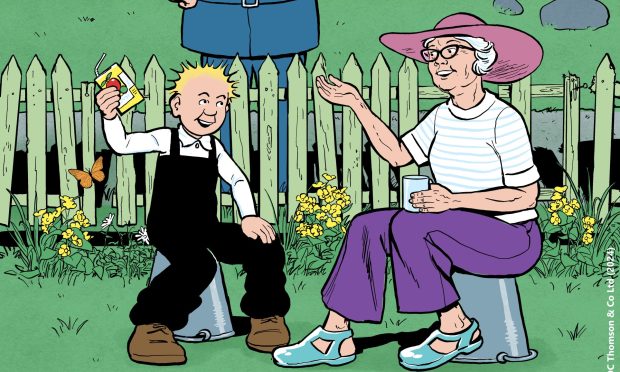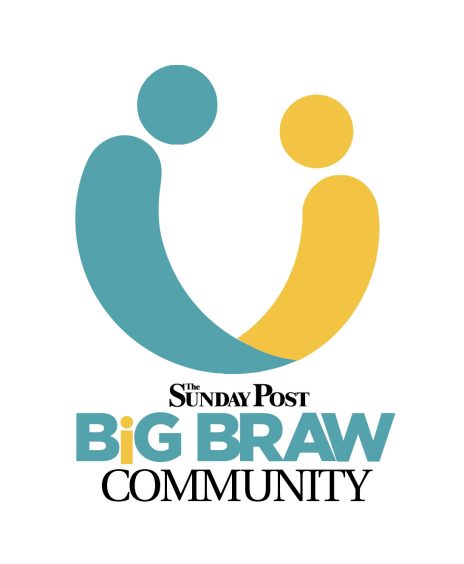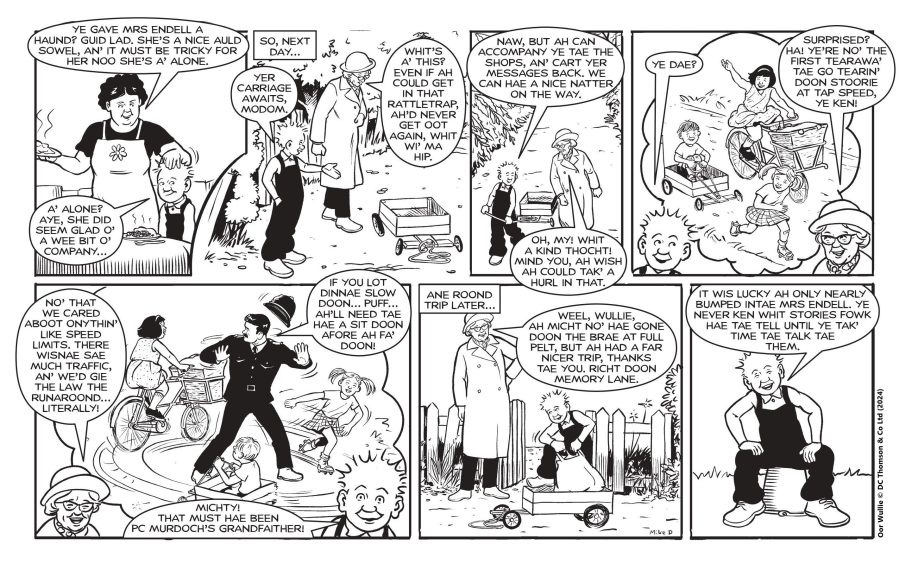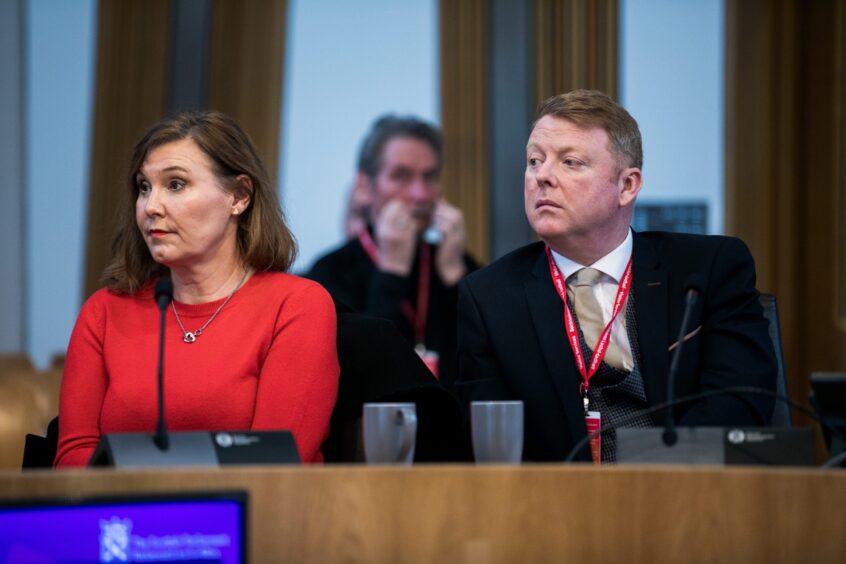
For generations Oor Wullie has been terrorising Auchenshoogle with his naughty antics but for three weeks, starting this Sunday, he’s going out of this way to help others.
Along with his gang, Bob, Wee Eck and Soapy Soutar, their tricks have exasperated local bobby PC Murdoch who try as he might, Oor Wullie always seems to get the upper hand.
But, suddenly, Auchenshoogle has become uncharacteristically quiet leaving PC Murdoch scratching his head.
Is Oor Wullie up to something naughty? Is he planning another “cartie Grand Prix” or some other jape that always ends with PC Murdoch looking like a daftie?
No, Wullie has joined the ‘Big Braw Community’, The Sunday Post’s inspiring campaign to end loneliness.
Oor Wullie tries being ‘good’
For the first time since Oor Wullie graced the pages of Scotland’s best loved newspaper The Sunday Post, on March 8, 1936, the beloved cartoon character created by writer RD Low and artist Dudley D Watkins, the naughty schoolboy is going out of his way to be “good”.
In a three-part strip that starts this weekend in The Sunday Post, Wullie finds out that there’s more to his widowed neighbour than he first thought and finds unexpected joy in helping others.
It is hoped that the surprising behaviour from the notorious mischief-maker will encourage Scotland to get behind the campaign. By doing just five simple things they can make a huge difference to someone’s life and help end loneliness.
The five ways that people could join the campaign include:
- Calling a relative or friend who is on their own for a chat.
- Checking on a neighbour who lives on their own and spend a few moments to find out how they are.
- If they’re going for a pint of milk, a loaf of bread or a newspaper, offering to get one for their neighbour.
- Sharing a cup of tea or coffee with someone who lives on their own – they might be the only other person they speak to in two weeks or more.
- If a couple of days pass by and they haven’t seen a neighbour who lives on their own, check and make sure they are okay.
Led by The Sunday Post, the Big Braw Community is all about bringing young and old together, to end loneliness and isolation. It aims to bring an end to loneliness using people power, inspiring others to give their time to head off the public health crisis before it overwhelms our health and care system.
The campaign is The Sunday Post’s response to the World Health Organisation warning that we are facing a public health crisis because of loneliness and isolation which increases the risk of dementia by 50 per cent, and the risk of strokes and heart problems by 30 per cent.
Editor Dave Lord said: “When we heard the World Health Organisation warning that loneliness is a public health crisis, we knew we could inspire our readers to make a positive change.
“The Sunday Post is not just a newspaper. We are part of Scotland’s heritage and culture.
“There cannot be a single family who has not grown up reading The Broons and Oor Wullie, so we are in the perfect position to reach out and encourage people everywhere to be a part of the Big Braw Community and do it in a way that is fun through our iconic comic strip.”
The Big Braw Community campaign
Following a loneliness summit at the Scottish Parliament last month hosted by The Sunday Post and Age Scotland, MSPs agreed to form a cross-party group to look at how best to tackle a problem which affects hundreds of thousands of Scots.
A quarter of a million Scots can go for two weeks or more without speaking to another person. And over 100,000 older Scots have reported feeling lonely all the time.
Adam Stachura, Age Scotland’s policy director said: “It is fantastic that The Sunday Post has thrown its weight behind such an important cause. The campaign is a tremendous opportunity for Scotland to get together to tackle one of the biggest challenges for the health of the nation and our society. One in ten of us is affected by chronic loneliness, feeling this way all or most of the time, but more than half of the country are experiencing this in some way.
“This is not just a major challenge for today but one which looks like it could get a lot worse for generations to come unless we collectively create more ways for people to be connected and build meaningful relationships. As the world becomes more digital, the personal interactions can fade, and people become more isolated.
“As we saw during the pandemic, we harnessed our community spirit to check in and build new relationships with our neighbours and particularly people who live alone. We’ve done it before, so we can do it again.”

Dr Jane Morris, the chair of the Royal College of Psychiatrists in Scotland also embraced the campaign, describing loneliness as a “distressing cruelty” and a “danger to health and wellbeing”.
She said: “This is an issue that we should all be concerned about because it affects all of us. I was horrified to learn that over 200,000 older Scots can go two weeks or more without speaking to another person.
“You only need to see a newborn baby reaching out for human connection to understand how important that is.”
She warned loneliness increases the risk of dementia by 50%, and the risk of heart problems or stroke by 30%. She added being a part of Scotland’s Big Braw Community was a “wonderful opportunity” and an “exciting campaign for positive change.”
Bafta-winning actors Gary Hollywood from Mrs Brown’s Boys, and Jane McCarry, who played Craiglang gossip Isa Drennan in the hit series Still Game, are campaign ambassadors and are planning a series of short films to help bring people together.
Gary said: “Every single family in Scotland has someone who is older and vulnerable, including us. That’s why we want to get these vital messages across and make a difference.”
Jane said: “In Still Game, everyone laughed at Isa Drennan because she was Craiglang’s resident gossip. But the sad truth about Isa was that she was lonely and that was why she was so nosey, so this campaign has huge resonance for me in many ways.”
One of Scotland’s most iconic and best loved figures, Glen Michael, who introduced generations to Cartoon Cavalcade, is also an ambassador at age 98.

Enjoy the convenience of having The Sunday Post delivered as a digital ePaper straight to your smartphone, tablet or computer.
Subscribe for only £5.49 a month and enjoy all the benefits of the printed paper as a digital replica.
Subscribe
 © Andrew Cawley
© Andrew Cawley